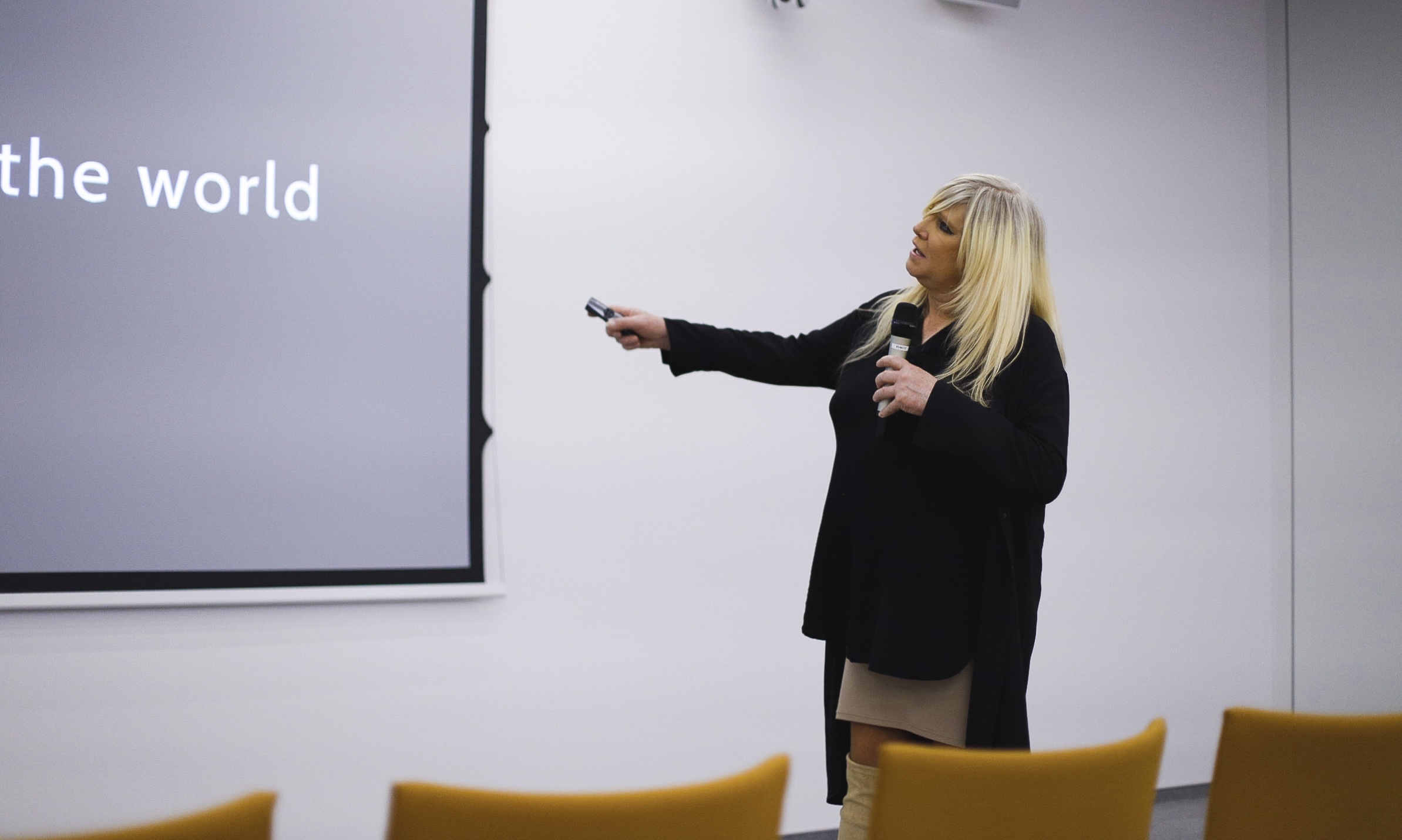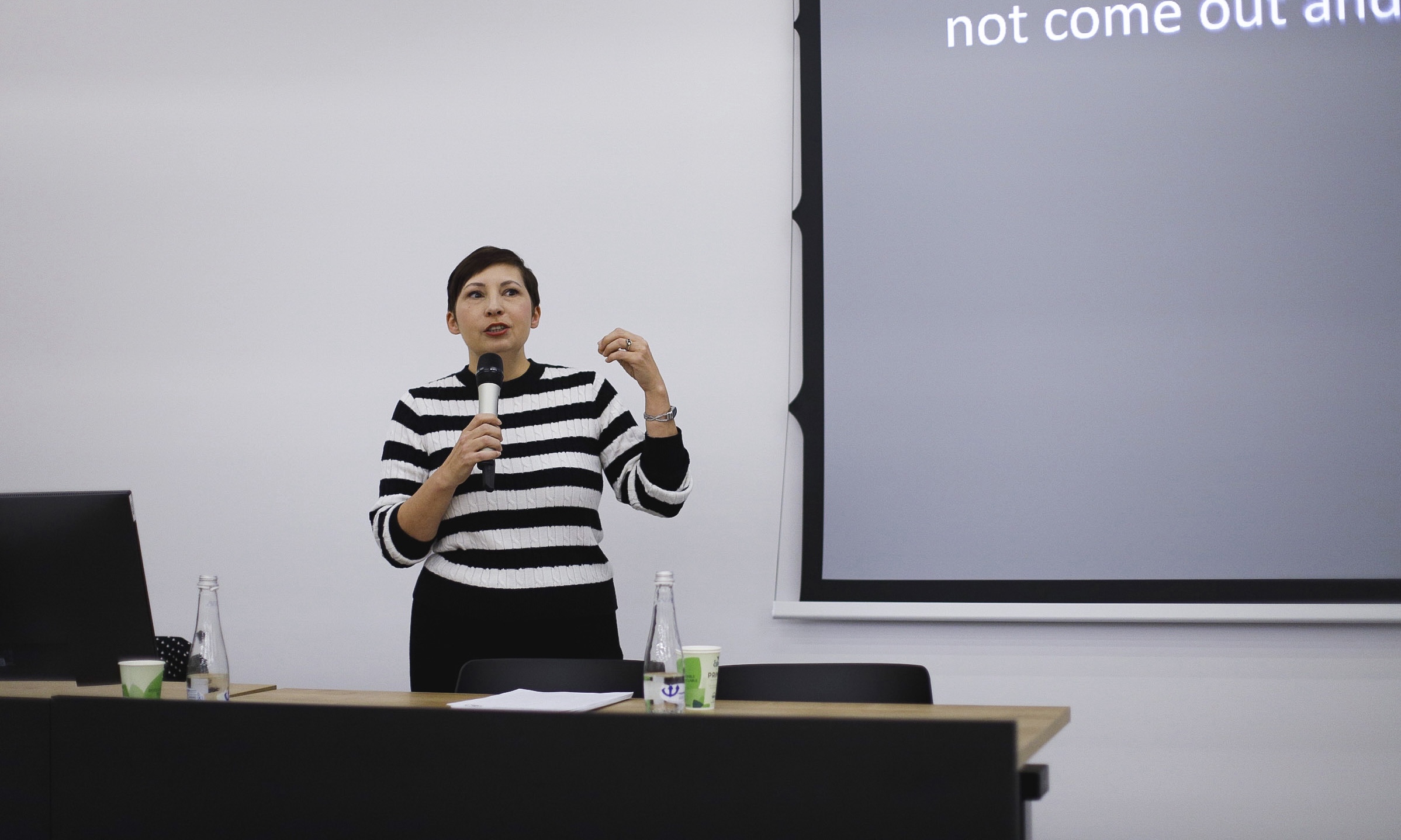 “Challenges in Transgender Individuals' Healthcare and Family Life: Social and Medical Aspects” / MF archive
“Challenges in Transgender Individuals' Healthcare and Family Life: Social and Medical Aspects” / MF archive
On November 13–14, a two-day event titled “Challenges in Transgender Individuals' Healthcare and Family Life: Social and Medical Aspects” took place at the Vilnius University Faculty of Medicine (VU MF) Science Center. The event was organized by the Educational Competencies Division in collaboration with the Department of Social Policy from the Faculty of Philosophy (FSF).
During the event, internationally renowned advocates for transgender rights, lecturers Jessica Lynn (she/her) and Debi Jackson (she/her), shared perspectives on understanding gender identity. They discussed key steps and practices for providing supportive medical care to transgender and non-binary patients and delivered open lectures to interested students.
The event was opened with welcoming remarks by Associate Professor Dr. Rūta Vosyliūtė, Head of the Educational Competencies Division at the Faculty of Medicine. “This topic is sensitive, new, and unusual, but the rising number of youth suicides and the spread of hate speech compel us to reflect and discuss what might feel ‘uncomfortable’ or ‘irrelevant to me.’ Vilnius University is distinguished by its openness, international outlook, and tolerance, making this event meaningful and relevant to all, especially the medical community,” said Dr. Vosyliūtė.
 Jessica Lynn / MF archive
Jessica Lynn / MF archive
“What do we mean by diversity? It’s the fact that none of us are the same as one another. Look around: we all have different skin tones, hair colors, body structures, gender identities, and ways of speaking... It is this diversity that makes the world beautiful. Yet, at the same time, this diversity has always been the object of discrimination,” Jessica Lynn stated. She invited listeners to look back through millions of years of evolution, highlighting periods when human biological traits, such as left-handedness, red hair, or skin color, were discriminated against. She shared shocking historical facts that encouraged reflection on humanity's cruel attempts to suppress diversity.
During their lectures, Jessica Lynn and Debi Jackson explored key concepts defining human biological diversity, including intersexuality (when a person does not fit the typical binary definitions of male or female bodies and has physical traits characteristic of both sexes); transsexuality (when an individual’s experience of gender identity is incongruent with the sex assigned at birth, often involving a desire to transition to the gender they identify with); and transgender identities (when a person’s gender identity differs from the one assigned at birth). They also covered broader terms such as LGBTQ, describing lesbian, gay, bisexual, transgender individuals, and others who are not heterosexual or cisgender, as well as asexuality, where individuals experience no sexual attraction.
The speakers also addressed the complexities of transgender identities in children, discussing the process of gender identity development and the age at which children or adolescents may begin to dissociate from their assigned gender. They emphasized the distinction between transsexuality and transgender identities, noting that the latter focuses on one’s lived experience of gender rather than a medical or surgical transition.
 Debi Jackson / MF archive
Debi Jackson / MF archive
Both speakers shared deeply personal and moving stories from their lives and families. Jessica Lynn recounted her life as a transgender woman and the physical and psychological challenges she has faced. Debi Jackson revealed her experience as the mother of a transgender child who, at the age of three or four, began expressing a gender identity different from the one assigned at birth. Today, Jackson’s child, now a teenager, identifies as non-binary.
Transgender individuals make up approximately 1% of the global population, yet studies suggest that around 3% of transgender individuals do not feel safe publicly identifying as transgender or as part of the transgender spectrum. This amounts to an estimated 80 million people worldwide falling under the “transgender umbrella.” “Ancient artifacts, literature, and other sources show that transgender individuals have existed not just in the U.S. or Europe but across the entire globe,” commented Jessica Lynn.
To reduce discrimination against transgender people, the speakers stressed the importance of avoiding microaggressions, such as asking overly personal questions about gender identity. One of the most effective ways to combat discrimination, they said, is through respectful language, including the correct use of pronouns (she/her, he/him, they/them) and chosen names. Family members often adopt a transgender individual’s new name more quickly than pronouns, but the most important step is showing respect and accepting the person as the gender they identify with.
About the Speakers
Jessica Lynn (she/her) is a globally recognized advocate for transgender rights, educator, and activist. Known for her dynamic, open, and sincere communication style, she is one of the most prominent educators on transgender issues worldwide. With her unique sense of humor and engaging Q&A sessions, Jessica has traveled over a million miles, visiting 28 countries and giving more than 1,200 presentations to educate the public about transgender experiences.
Debi Jackson (she/her) is a renowned advocate for transgender rights and the mother of a transgender child. She frequently travels to raise awareness about transgender children. In 2016, she received the Role Model Award from the National Education Association’s LGBT Caucus. Debi collaborates with esteemed organizations such as PFLAG, the Human Rights Campaign, Gender Odyssey, and the Trevor Project. Her involvement with these organizations, along with personal connections to thousands of transgender adults and families with transgender children, has enriched her understanding of the social and healthcare needs of transgender individuals.
